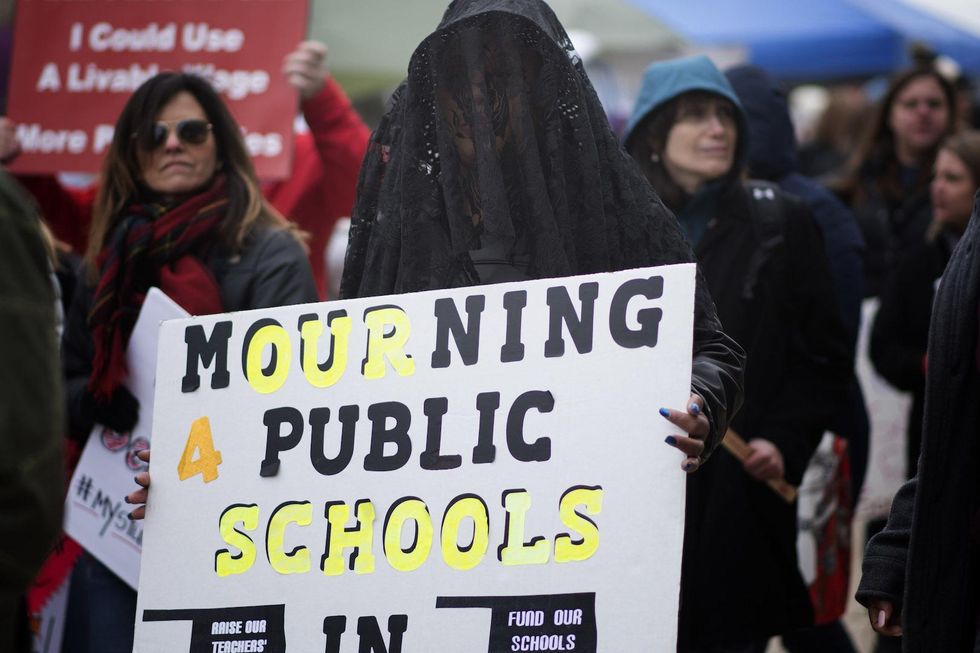After nine days of school closures, the Oklahoma teachers' strike is largely over after the president of the state's largest teachers' union said Thursday that teachers should go back to school and focus efforts on supporting pro-education candidates in November.
The Oklahoma Legislature passed a bill that raised teachers' salaries by an average of $6,100, raised support staff salaries by $1,250, and provided additional general education funding, but that took place before the strike began.
The teachers did not force any significant legislation during the work stoppage, despite demands for more funding than the tax increase provided.
Why did the strike end?
Alicia Priest, president of the Oklahoma Education Association, said that the strike had accomplished all it could, and that the focus should turn to midterm elections. The OEA was the union largely responsible for coordinating the strike.
"We recognize that our formal efforts to lobby elected leaders have achieved all that we will be able to accomplish this legislative session," Priest said during a news conference Thursday. "Despite tens of thousands of people filling the Capitol and spilling out over the grounds for nine days, we have seen no significant legislative movement since last Friday.
"The Legislature, however, has fallen well short of its responsibility to Oklahoma's students," Priest continued. "As classes resume, we must turn our attention toward the election season. Instead of making our case at the steps of the Capitol, we have the opportunity to make our voices heard at the ballot box. The state didn't find itself in this school funding crisis overnight. We got here by electing the wrong people to office."
Out of time?
Parvin Smith, a music teacher in the Mid-Del school district near Oklahoma City, told TheBlaze he believes calendar pressure contributed to the end of the strike more than anything.
"It was a very abrupt move. It totally caught the teachers by surprise," Smith said of the strike's end.
"The strongest influence was the calendar," Smith said. "We only have a small window for state testing. The state extended that for a week. However, we are getting close to the federal limit. Miss that and we lose $700 million in federal funds."
Smith also pointed to the issues caused by extending the school calendar to make up for missed days.
"Teachers and students have made plans for summer jobs, travel, joining military service, etc.," Smith said. "The schools have also already reserved big venues for graduation. Those venues won't allow date changes this late. Having graduation ceremonies before the students actually do all the work necessary to graduate could cause all kinds of problems."
Was the strike effective?
The abrupt end to the strike left some teachers confused and disappointed, having spent nearly two weeks away from their students and lobbying at the Capitol to no avail.
State Senate Majority Leader Greg Treat (R-OKC) said he was frustrated by "mixed messages" from the union about what they actually wanted in order to end the strike, and that he has heard from numerous teachers who had different opinions than the unions.
"I've heard it a myriad of times this week in meetings with teachers: 'Hey, the OEA doesn't represent me. Hey, the POE doesn't represent me,'" Treat said, according to NonDoc. "To be honest, I don't know if there's one central person in charge of the whole teacher walkout. One of my frustrations has been that, if we are wanting to negotiate, if we are wanting to give assurances, who is the person to talk to? And I've yet to get an answer."
What was going on when the strike ended?
There was not much significant legislative movement during the strike, but there were some non-tax related proposals being considered earlier in the week, the future of which is now unclear.
Republican state Reps. Sean Roberts and Tess Teague filed six bills Wednesday that aimed at reducing inefficiency within the state educational system and increasing accountability for the use of resources. Those bills would:
- Require the Commissioners of the Land Office to give a $500 annual stipend to every teacher for classroom supplies
- Cap superintendent salaries to be no higher than that of the governor, who currently makes $147,000 per year
- Consolidate superintendents across school districts in counties with fewer than 400,000 citizens (Oklahoma has more than 500 districts currently)
- Require the state superintendent to submit a rolling five-year plan for meeting education needs
- Reallocate $15 million of state lottery funding to pay for textbooks and school technology
The proposals capping superintendent salaries and consolidating districts likely will be met with opposition by superintendents who could find themselves out of a job or those in small districts who serve in dual roles as teachers and coaches.
This writer's perspective
Ending the strike this way indicates to me that it never should have happened. Gov. Mary Fallin signed teacher raises and additional funding into law days before the strike began, so if that was enough for them to end the strike now, it should've been enough for them not to strike at all.
To strike and then quit without achieving any notable legislative goals leaves a bad taste in everyone's mouths. Legislators are frustrated, teachers are disappointed, and the union winds up looking like it had no idea what it was setting out to do. It appears the union underestimated the resolve of legislators, and overestimated its own leverage.
Additionally, there are significant efforts, including one spearheaded by former Sen. Tom Coburn, to make sure that some of the tax raises signed into law before the strike get repealed. The end result could be a situation in which the law calls for increased teacher pay, but there is not adequate funding for it. That'll lead to more cuts, both of jobs and of services.
Oklahoma teacher pay needs to be higher so the state can attract and retain quality educators, and Oklahoma schools need more money to operate. The numbers show that clearly. But this nine-day disruption, regardless of how it is painted by union leadership, looks more like a miscalculation than anything. Hopefully, it doesn't result in a worse situation for Oklahoma schools than existed before.
We'll find out if the momentum and energy that surrounded this work stoppage will carry over into votes and change in the Legislature in November. If not, all we're left with is higher taxes, still-disgruntled teachers, underfunded schools, and no solutions in sight.




